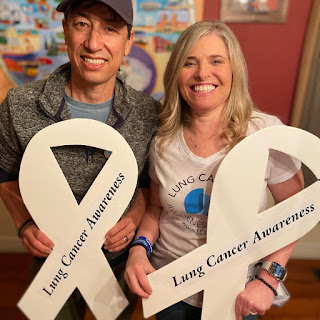Addressing the Problem of Drug-Resistant Cancer
Meet Johnathan
Whetstine, PhD.
Cancer cells that stop responding to treatment (drug
resistance) are a common cause of cancer deaths. Researchers are trying to
understand how to treat resistance, and/or prevent it in the quest for the next
generation of cancer therapies that can save lives. One such researcher, Johnathan
Whetstine, PhD and his team in the Whetstine
Laboratory at the Mass
General Center for Cancer Research is studying how cancer cells become
drug-resistant. They recently uncovered a protein that generates specific DNA
fragments containing genes that cause cancer cells to become resistant to
chemotherapy. This allows replicating cancer cells to grow and defend
themselves against previously effective treatments. We all know how devious
cancer cells are in trying to outsmart treatments.
The Whetstine Laboratory’s discovery was the first of its
kind, and provides a new way to understand how cancer cells change their DNA
content and potentially acquire the ability to become treatment resistant. In
fact, their discovery identified a new protein to evaluate in tumors and
directly relates to cancer cell response to therapy. Most recently, Dr.
Whetstine’s group used a drug to target the protein and was able to block the
extra DNA pieces associated with drug resistance. These findings illustrate the
importance of evaluating this protein in tumors and demonstrate that this
process does not occur randomly but can be directed and targeted by proteins
within the cell. Dr. Whetstine’s group is currently uncovering additional genes
and conditions that can generate extra DNA pieces involved in cancer cell drug
resistance. This work holds promise for the development of new strategies to
block resistances to chemotherapies and targeted therapies with broad and
profound implications for many different types of cancer.
Tumor cells contain extra copies of DNA that ultimately
contribute to their lack of response to chemotherapeutics and aggressive
behavior. The Whetstine Laboratory is working to uncover the genes and proteins
that promote copy gains of DNA regions and stimulate resistance to help identify
novel drug targets associated with aggressive drug resistant cancer and provide
novel biomarkers to evaluate in patients during the course of therapy so that
resistance may be predicted earlier. The Whetstine Laboratory has now unlocked
a way to better understand copy gains related to tumorigenesis and have firmly
established that these events are regulated.
The Whetstine’s Laboratory is another of the research
programs that needs philanthropic support – in this case to investigate how
treatment resistance occurs, how we can think about blocking drug resistance
and how we can help identify patients who are most vulnerable to emerging drug
resistance. Their studies are currently aimed at addressing this question in
lung cancer, ovarian cancer, myeloma, breast cancer and neuroblastoma.
One of the Disruptive
Dozen
The culture of innovation at Massachusetts General Hospital
and Brigham and Women’s Hospital —throughout all of Partners HealthCare and
collaborating institutions such as Dana-Farber Cancer Institute—naturally
fosters a good deal of discussion about new “disruptive” technologies and which
ones will have the biggest impact in bringing novel complex health care
products and services to greater levels of affordability and accessibility. The
mission of Partners clinicians and researchers to provide the best care for
patients drives a continuous dialogue on what state-of-the-art medical
technologies are just over the horizon. The Disruptive Dozen was created to
identify and rank the most disruptive technologies that Partners leading
faculty feel will break through over the next decade in cancer care.
Johnathan Whetstine was recognized for his work at the Partners
World Medical Innovation Forum in April as one of the most promising
technologies (number 5) that will have significant impact on cancer care in the next 10
years. He and his wife are also our friends, and fellow MGH one hundred honorees. #gratitude


